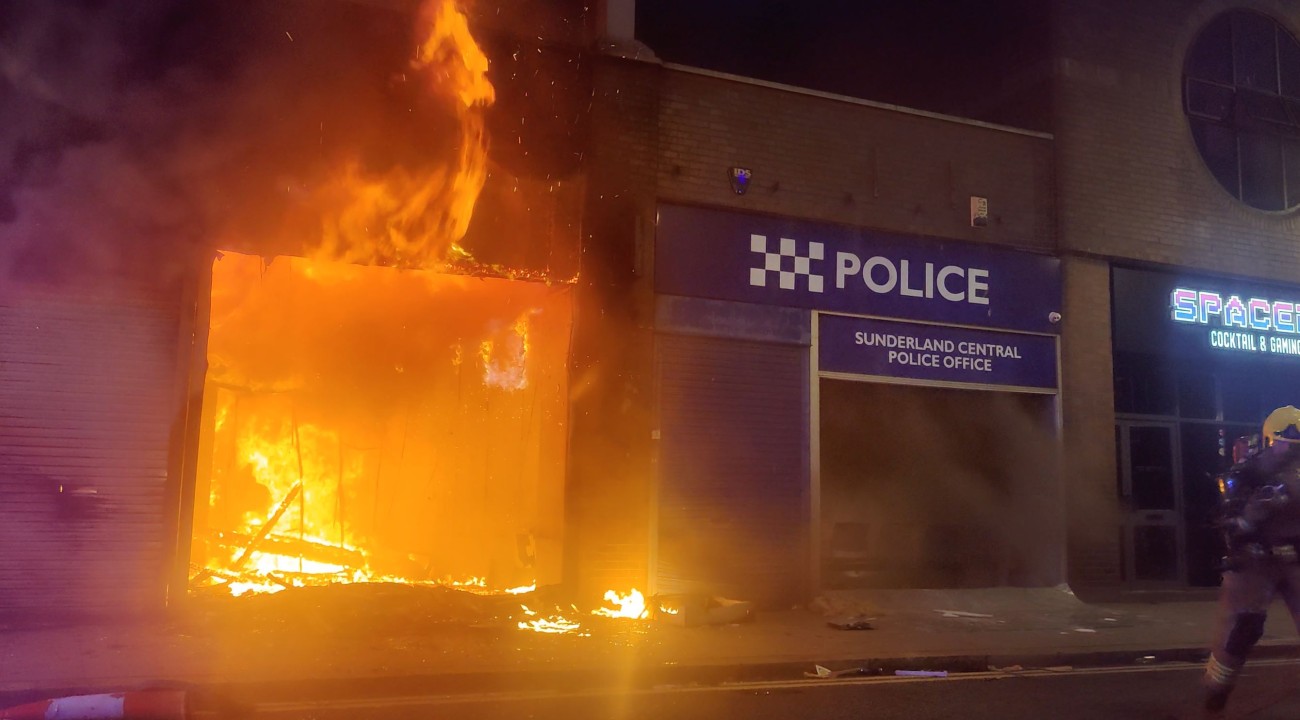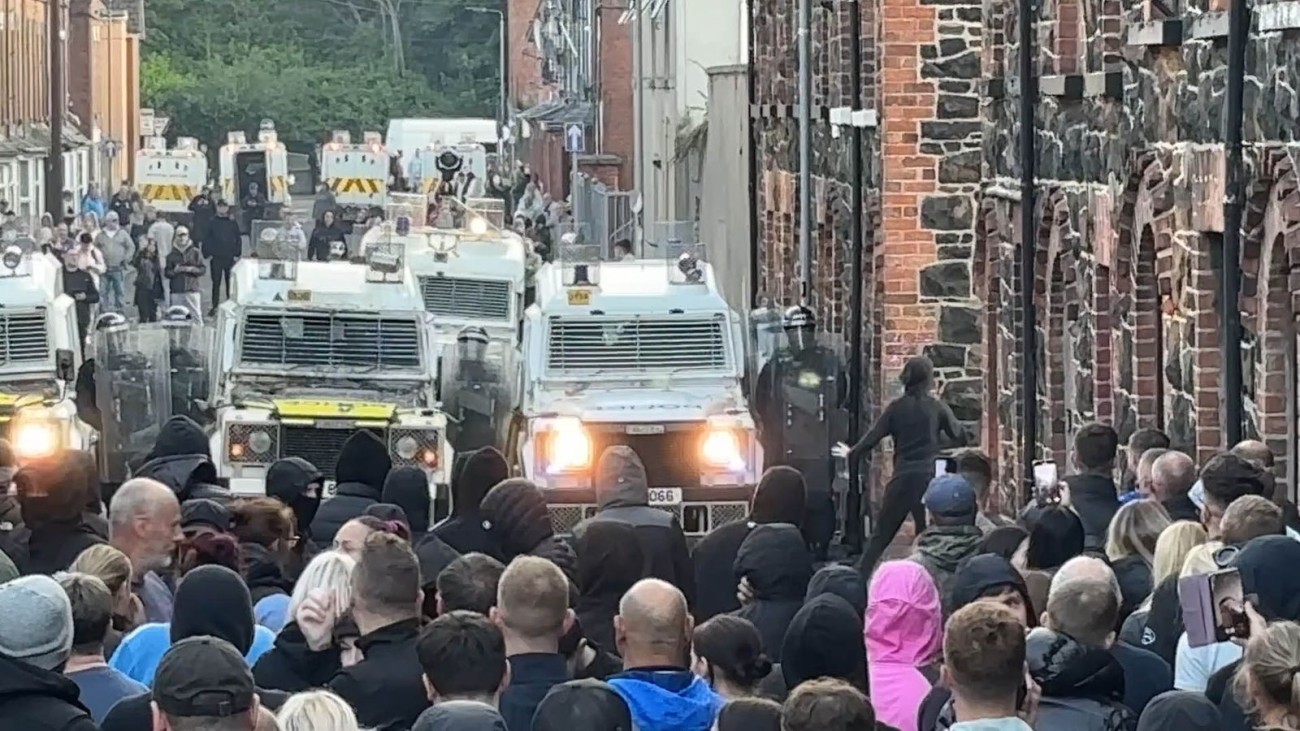
I watched the riots erupt in Ballymena with a strange mix of horror and understanding. No one wants to see a British town in flames. No one wants to hear the sound of sirens and shattered glass where there should be peace. But let’s not kid ourselves: when the people riot, it is because the system has failed so completely, so catastrophically, that all avenues of redress feel closed off. I am a law-abiding citizen. A former soldier and policeman. I’ve worked, paid my taxes, obeyed the rules. But today, I no longer recognise the country I live in, and I can no longer trust the institutions that claim to govern it.
Ballymena isn’t an isolated explosion. It’s the latest signal flare in a long, smouldering breakdown of trust between the British people and their rulers. What happened in northern England last summer was a warning. This is the aftershock. And if nothing changes, worse is coming.
We are governed now by people who, in my view, hold ordinary Britons in contempt. They lecture us about tolerance while ignoring our concerns. They brand us racist or far-right for defending our history, culture, and values. They open our borders, flood towns with unvetted newcomers, then tell us we’re the problem when we notice the consequences. Multiculturalism was supposed to enrich our society. Instead, it has divided it. Almost destroyed it. And the government’s refusal to acknowledge this reality has become a source of deep national anger.
We were promised integration. What we got was Balkanisation. In town after town, parallel societies have formed, communities living side-by-side, not together. There is no shared identity, no common language of belonging. If we question this, we’re accused of hate. But what we’re really mourning is the loss of cohesion, the slow erasure of what it meant to be British. This isn’t xenophobia. It’s grief. And it’s being ignored.
The final straw for many isn’t just immigration and multiculturalism. It’s the sense that justice no longer applies equally. A YouGov poll just confirmed that a majority of the public no longer trusts the judiciary. I’m not surprised. I’ve seen with my own eyes how certain groups are treated with kid gloves while others are hammered for minor offences, or even just for speaking out.
We see rioters in some communities explained away as “disaffected youth” while those who protest against illegal immigration or cultural breakdown are branded extremists. This two-tier system is tearing society apart. Justice is no longer about right or wrong, it’s about who ticks which demographic or political box.
The police used to be guardians of law and order. Men and women become police officers for a large variety of reasons. Like in every other occupation there are the bad eggs, but most, at rank-and-file level, are decent enough and, on joining at least, have at the back of their mind that they might do some good.
My force was the Northumbria Police, and I was stationed in a town that had little diversity until very recently when the cranks that run it declared it a ‘city of refuge’ (with no reference at all to the people of the town). At any rate, I was never exposed to the full horror of politically correct policing. But I did see it creep in before I retired, first of all in use of language and the creeping impression, seeping down from the top, that criminals were somehow victims and should be treated with sympathy. Well, all I can say is that most criminals in my experience are worthless scum, who prey on the most vulnerable and take every advantage of what they rightly perceive as weakness, and deserve far worse punishment than the system metes out.
But today, as we all know, the police are a very strange mixture of social worker, social engineers and, when it comes to those who resist the politically correct narrative, enforcers for the State’s social policies. They kneel at protests that align with government-approved narratives. They knock on doors over mean tweets. But when working-class communities plead for help as crime rises or social norms collapse, they are ignored at best and at worst treated as morally degenerate. No victims they!

This is not policing. It’s suppression.
I don’t condone violence. But watching the riots that hit my hometown last year and just recently in Northern Ireland, all happening for the same basic reasons of government driven mass immigration and contempt for the British people, I understand where it comes from.
When people feel unheard, ignored, and betrayed, when they see their streets change overnight, their laws warped, their culture ridiculed, they eventually erupt. The media calls them thugs. The politicians call them bigots. But I call them what they are: citizens abandoned by their own government.
The Ballymena rioters weren’t born criminals. They are part of a population that’s been pushed too far, for too long. First by the imposed ideology of multiculturalism, then by a legal system that punishes dissent, and finally by a political class that is steadily erasing national identity in favour of some borderless, global future that no one voted for.
The more you look, the more it seems like the destruction of national identity isn’t a mistake but is instead government strategy. Everything British is rebranded as offensive or outdated. Statues come down. Traditions are mocked. Free speech is choked. And all the while, our borders remain open, our values diluted, and our voices silenced.
This doesn’t feel like governance. It feels like a regime change, from above. It feels like a move toward a one-world model of control, where national sovereignty and democratic input are replaced by technocrats and global institutions. In this system, identity is a threat, and tradition must be dismantled.
So, when I see riots break out, I don’t see mindless violence. I see a scream in the dark, a desperate cry from people who believe, as I do, that the State is no longer on their side. That the institutions built to protect us are being used to reshape us. That our own government no longer defends our culture, our rights, or our future.
This is not sustainable. You cannot govern a people you despise. You cannot demand obedience from those you refuse to hear. If Ballymena tells us anything, it is that more of this is coming. Unless something changes, unless the government reclaims its duty to the nation and not to ideology, these riots will not be the last.
They will be the beginning.